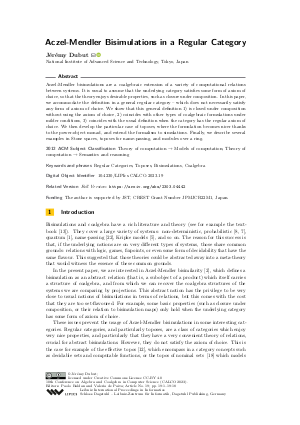Aczel-Mendler Bisimulations in a Regular Category
Author
Jérémy Dubut 
-
Part of:
Volume:
10th Conference on Algebra and Coalgebra in Computer Science (CALCO 2023)
Part of: Series: Leibniz International Proceedings in Informatics (LIPIcs)
Part of: Conference: Conference on Algebra and Coalgebra in Computer Science (CALCO) - License:
 Creative Commons Attribution 4.0 International license
Creative Commons Attribution 4.0 International license
- Publication Date: 2023-09-02
File

PDF
LIPIcs.CALCO.2023.19.pdf
- Filesize: 0.77 MB
- 18 pages
Document Identifiers
Related Versions
- Full Version https://arxiv.org/abs/2303.04442
Subject Classification
ACM Subject Classification
- Theory of computation → Models of computation
- Theory of computation → Semantics and reasoning
Keywords
- Regular Categories
- Toposes
- Bisimulations
- Coalgebra
Metrics
- Access Statistics
-
Total Accesses (updated on a weekly basis)
0Document
0Metadata
Abstract
Aczel-Mendler bisimulations are a coalgebraic extension of a variety of computational relations between systems. It is usual to assume that the underlying category satisfies some form of axiom of choice, so that the theory enjoys desirable properties, such as closure under composition. In this paper, we accommodate the definition in a general regular category - which does not necessarily satisfy any form of axiom of choice. We show that this general definition 1) is closed under composition without using the axiom of choice, 2) coincides with other types of coalgebraic formulations under milder conditions, 3) coincides with the usual definition when the category has the regular axiom of choice. We then develop the particular case of toposes, where the formulation becomes nicer thanks to the power-object monad, and extend the formalism to simulations. Finally, we describe several examples in Stone spaces, toposes for name-passing, and modules over a ring.
Cite As Get BibTex
Jérémy Dubut. Aczel-Mendler Bisimulations in a Regular Category. In 10th Conference on Algebra and Coalgebra in Computer Science (CALCO 2023). Leibniz International Proceedings in Informatics (LIPIcs), Volume 270, pp. 19:1-19:18, Schloss Dagstuhl – Leibniz-Zentrum für Informatik (2023)
https://doi.org/10.4230/LIPIcs.CALCO.2023.19
BibTex
@InProceedings{dubut:LIPIcs.CALCO.2023.19,
author = {Dubut, J\'{e}r\'{e}my},
title = {{Aczel-Mendler Bisimulations in a Regular Category}},
booktitle = {10th Conference on Algebra and Coalgebra in Computer Science (CALCO 2023)},
pages = {19:1--19:18},
series = {Leibniz International Proceedings in Informatics (LIPIcs)},
ISBN = {978-3-95977-287-7},
ISSN = {1868-8969},
year = {2023},
volume = {270},
editor = {Baldan, Paolo and de Paiva, Valeria},
publisher = {Schloss Dagstuhl -- Leibniz-Zentrum f{\"u}r Informatik},
address = {Dagstuhl, Germany},
URL = {https://drops.dagstuhl.de/entities/document/10.4230/LIPIcs.CALCO.2023.19},
URN = {urn:nbn:de:0030-drops-188163},
doi = {10.4230/LIPIcs.CALCO.2023.19},
annote = {Keywords: Regular Categories, Toposes, Bisimulations, Coalgebra}
}
Author Details
Funding
The author is supported by JST, CREST Grant Number JPMJCR22M1, Japan.
References
-
Samson Abramsky. Coalgebras, Chu spaces, and representations of physical systems. Journal of Philosophical Logic, 42:551-574, 2013.

-
Peter Aczel and Nax Mendler. A final coalgebra theorem. In Proceedings of Category Theory and Computer Science, volume 389 of Lecture Notes in Computer Science. Springer, 1999.

-
Emilio Jesús Gallego Arias and James B. Lipton. Logic Programming in Tabular Alegories. In Technical Communications of the 28th International Conference on Logic Programming (ICLP'12), Leibniz International Proceedings in Informatics, pages 334-347. Schloss Dagstuhl, 2012.

-
Roland Backhouse and Paul Hoogendijk. Final dialgebras: from categories to allegories. Theoretical Informatics and Application, 33:401-426, 1999.

-
Nick Bezhanishvili, Gaelle Fontaine, and Yde Yenema. Vietoris bisimulations. Journal of Logic and Computation, 20(5):1017-1040, 2010.

-
Filippo Bonchi, Marcello Bonsangue, Michele Boreale, Jan Rutten, and Alexandra Silva. A coalgebraic perspective on linear weighted automata. Information and Computation, 211:77-105, 2012.

- Vincent Danos, Josée Desharnais, Francois Laviolette, and Prakash Panangaden. Bisimulation and cocongruence for probabilistic systems. Information and Computation, 204(4):503-523, 2006. URL: https://doi.org/10.1016/j.ic.2005.02.004.
- Josée Desharnais, Abbas Edalat, and Prakash Panangaden. Bisimulation for Labelled Markov Processes. Information and Computation, 179(2):163-193, 2003. URL: https://doi.org/10.1006/inco.2001.2962.
-
Peter Freyd and Andre Scedrov. Categories, Allegories, volume 39 of Mathematical Library. North-Holland, 1990.

-
Chris Heunen, Ohad Kammar, Sam Staton, and Hongseok Yang. A convenient category for higher-order probability theory. In Proceedings of the 32nd Annual ACM/IEEE Symposium on Logic in Computer Science (LICS'17), 2017.

-
Jesse Hughes and Bart Jacobs. Simulations in coalgebra. Theoretical Computer Science, 327(1-2):71-108, 2004.

-
J. Martin E. Hyland. The effective topos. In The L.E.J. Brouwer Centenary Symposium, volume 110 of Studies in Logic and the Foundations of Mathematics, pages 165-216, 1982.

-
Bart Jacobs. Introduction to Coalgebra: Towards Mathematics of States and Observation, volume 29 of Cambridge Tracts in Theoretical Computer Science. Cambridge University Press, 2017.

-
Peter T. Johnstone. Sketches of an Elephant: A Topos Theory Compendium, volume 1. Oxford University Press, 2002.

-
Peter T. Johnstone. Sketches of an Elephant: A Topos Theory Compendium, volume 2. Oxford University Press, 2002.

-
André Joyal, Mogens Nielsen, and Glynn Winskel. Bisimulation from Open maps. Information and Computation, 127:164-185, 1996.

-
F. William Lawvere. Equality in hyperdoctrines and comprehension schema as an adjoint functor. In Proceedings of the AMS Symposium on Pure Mathematics XVII, pages 1-14, 1970.

-
F. William Lawvere. Qualitative Distinctions between some Toposes of Generalized Graphs. Contemporary Mathematics, 92, 1989.

-
Saunders MacLane and Ieke Moerdijk. Sheaves in Geometry and Logic: A First Introduction to Topos Theory. Springer New-York, 1992.

-
Davide Sangiorgi. A theory of bisimulations for the π-calculus. Acta Informatica, 33:69-97, 1996.

-
Alex Simpson. Measure, randomness and sublocales. Annals of Pure and Applied Logic, 163(11):1642-1659, 2012.

-
Sam Staton. Name-passing process calculi: operational models and structural operational semantics. PhD thesis, University of Cambridge, 2008.

-
Sam Staton. Relating Coalgebraic Notions of Bisimulation. Logical Methods in Computer Science, 7:1-21, 2011.

-
Paulo Tabuada. Open Maps, Alternating Simulations and Control Synthesis. In Proceedings of the 15th International Conference in Concurrency Theory (CONCUR'04), volume 3170 of Lecture Notes in Computer Science, pages 466-480. Springer, 2004.

-
Michael Winter. Goguen Categories: A Categorical Approach to L-fuzzy Relations. Number 25 in Trends in Logic. Springer, 2007.

-
Thorsten Wißman, Jérémy Dubut, Shin-ya Katsumata, and Ichiro Hasuo. Path Category for Free: Open Morphisms from Coalgebras with Non-deterministic Branching. In Proceedings of the 22nd International Conference on Fondations of Software Science and Computation Structures (FoSSaCS'19), volume 11425 of Lecture Notes in Computer Science. Springer, 2019.

